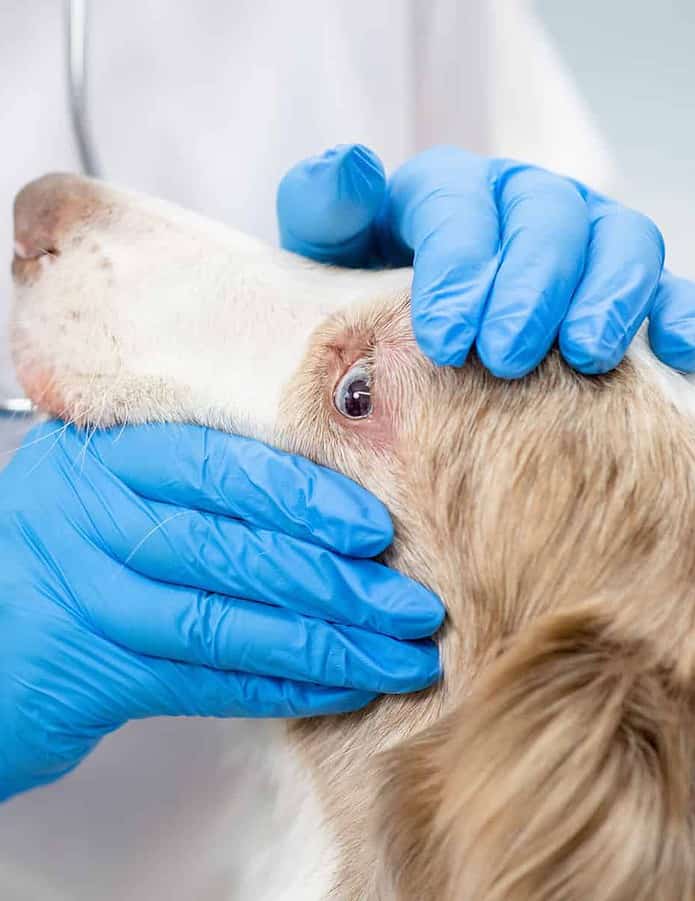Eye problems in dogs are relatively common and can range from mild to severe. As a responsible dog owner, it is crucial to be aware of the various eye conditions that can affect your furry friend, as early detection and intervention can help prevent complications and ensure your dog’s comfort and well-being. In this guide, we will explore different types of eye problems in dogs, their causes, symptoms, and available treatment options.
Common Eye Problems in Dogs
There are several eye problems that dogs can experience, including:
Conjunctivitis (Pink Eye)
Conjunctivitis is an inflammation of the conjunctiva, the tissue that lines the eyelids and covers the white part of the eye. This condition can be caused by allergies, infections, irritants, or underlying health issues. Symptoms include redness, discharge, swelling, and excessive tearing.
Keratitis (Corneal Inflammation)
Keratitis is an inflammation of the cornea, the clear, outer layer of the eye. It can be caused by infections, trauma, immune-mediated diseases, or exposure to irritants. Symptoms include redness, pain, squinting, and sensitivity to light.
Corneal Ulcers
A corneal ulcer is a break or erosion in the cornea, which can result from trauma, infections, or underlying health issues. Corneal ulcers can be painful and may lead to vision loss if left untreated. Symptoms include squinting, excessive tearing, discharge, and a cloudy appearance to the eye.
Glaucoma
Glaucoma is a condition in which increased pressure within the eye damages the optic nerve, potentially leading to vision loss. It can be primary (inherited) or secondary (caused by another eye condition). Symptoms include redness, pain, dilated pupils, and vision loss.
Cataracts
Cataracts are a clouding of the eye’s lens, leading to impaired vision. They can be inherited or develop due to aging, trauma, or diseases such as diabetes. Symptoms include a cloudy appearance to the eye, impaired vision, and difficulty navigating in low light.
Cherry Eye
Cherry eye is a prolapse of the gland of the third eyelid, which results in a red, swollen mass in the inner corner of the eye. It is more common in certain breeds, such as Bulldogs and Cocker Spaniels. Symptoms include redness, swelling, and discharge.
Entropion
Entropion is a condition in which the eyelid rolls inward, causing the eyelashes to rub against the cornea, leading to irritation and discomfort. It is often a genetic condition, affecting breeds such as Shar-Peis and Chow Chows. Symptoms include redness, tearing, and sensitivity to light.
Causes of Eye Problems in Dogs
Eye problems in dogs can have various causes, including:
- Infections: Bacterial, viral, or fungal infections can lead to eye conditions such as conjunctivitis or keratitis.
- Allergies: Allergic reactions to environmental factors, food, or medication can cause eye irritation and inflammation.
- Trauma: Injury to the eye or surrounding area can result in corneal ulcers, inflammation, or other eye problems.
- Genetics: Certain breeds maybe predisposed to specific eye conditions due to their genetic makeup, such as entropion in Shar-Peis or cataracts in Cocker Spaniels.
- Underlying Health Issues: Systemic health problems, such as diabetes or autoimmune diseases, can contribute to the development of eye problems in dogs.
Symptoms of Eye Problems in Dogs
Signs of eye problems in dogs can vary depending on the specific condition. However, some common symptoms to watch for include:
- Redness or inflammation
- Discharge or excessive tearing
- Squinting or sensitivity to light
- Swelling or protrusion of the eye
- Cloudy or hazy appearance to the eye
- Visible discomfort or pawing at the eye
- Impaired vision or difficulty navigating
If you notice any of these symptoms in your dog, consult your veterinarian promptly, as early intervention can help prevent complications and ensure your dog’s comfort and well-being.
Diagnosis
To diagnose an eye problem in your dog, your veterinarian will perform a thorough physical examination and evaluate your dog’s ocular health. They may use specialized tools, such as an ophthalmoscope or a slit lamp, to examine the eye more closely. Additional diagnostic tests, such as a Schirmer tear test, fluorescein staining, or tonometry (to measure eye pressure), may also be performed to help determine the cause of the eye problem.
Treatment Options
Treatment for eye problems in dogs will depend on the specific condition, its severity, and the underlying cause. Some common treatment options include:
- Topical Medications: Eye drops or ointments containing antibiotics, anti-inflammatory agents, or antifungal medications may be prescribed to treat infections, inflammation, or corneal ulcers.
- Oral Medications: In some cases, oral antibiotics or anti-inflammatory drugs may be necessary to address systemic infections or inflammation.
- Surgery: Surgical intervention may be required for conditions such as cherry eye, entropion, or severe corneal ulcers.
- Management of Underlying Health Issues: If the eye problem is related to an underlying health condition, such as diabetes or an autoimmune disease, appropriate management of that condition will be crucial in resolving the eye problem.
Relevant Sources:
By staying informed about eye problems in dogs, you can provide your dog with the best possible care and support. Remember to consult your veterinarian if you have any concerns about your dog’s eye health and work together to develop a tailored care plan for your furry friend.
